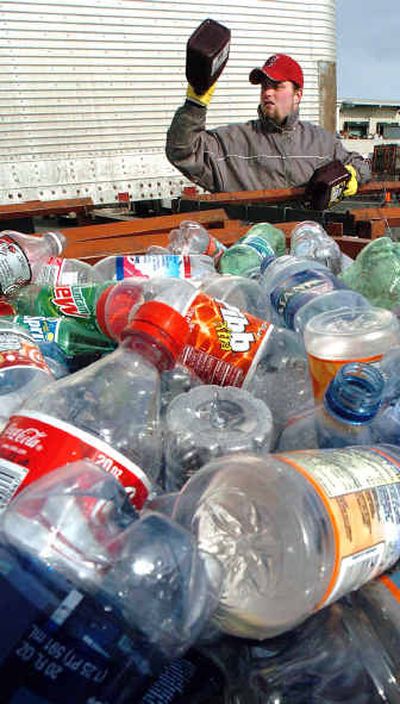WSU isn’t quite trashing RecycleMania competition

Judi Dunn is excited about how well WSU did the first week, and she has a game plan for how to do even better.
It’s Washington State University’s first year participating in RecycleMania, a nationwide competition in recycling among 49 colleges and universities. The 10-week green contest, supported by the Environmental Protection Agency, started Jan. 30, but results for the first week have just been reported on the Web site: www.RecycleManiacs.org.
“I’m really pleased with how our university did and I think with more advertising and commitment from students and challenges from professors, we can hold our own,” said Dunn, recycling and sustainability education coordinator at the university. “We can show our Cougar pride.”
WSU is the only Washington institute of higher education to participate in RecycleMania since its inception in 2001.
The competition has two components: a per capita recycling contest, with results calculated in pounds recycled per student, and a recycling rate contest, with results calculated by dividing the amount of recycled material by the total amount of trash.
WSU is participating in the latter, and it boasted a 29.05 percent recycling rate the first week. This puts WSU in sixth place so far, out of 27 institutions.
The 39,835 pounds – 19.92 tons – of recycled material saved the university thousands of dollars in trash disposal costs, Dunn said. That figure accounts for the three recyclable material categories the competition defined – paper, cans and bottles, and cardboard – and is not the total amount of recycling the university does. It does not count the recycling of colored plastics, like yogurt cups, or food waste.
The recycling center is educating the university on using the recycling bins and barrels on campus, said Erin Manderville, a special programs assistant. “Over 50 percent of what people throw away is recyclable.”
The university is also trying to encourage the reuse of materials. People on campus use 30,000 coffee cups a week, Dunn said. “Can you imagine the decrease we would have in waste if everybody used a reusable cup?” she said. “That’s a huge amount.”
For the occasion, dining services is giving customers a 25-cent discount on beverages if they use a reusable cup. “That’s our whole goal,” Dunn explained. “Decrease the waste.”
The campus newspaper, the Daily Evergreen, is also involved with the project. It features on its pages questions about RecycleMania, and winners receive prizes – ranging from Cougar sweatshirts to espresso coupons – donated by the larger community.
“Recycling and sustaining the planet is everybody’s job – students, faculty, staff,” Dunn said. “There’s no ‘This is not my job.’ This should be everybody’s responsibility.”
The two goals – increasing recycling and decreasing the amount of trash – are what the EPA strives for, said Thea McManus, associate division director of EPA’s Municipal and Industrial Solid Waste Division.
The agency offers technical help, such as with the Web site, and information on how to measure waste, and facilitates communication among the various universities.
Since the EPA got involved in 2004, participation has nearly tripled. Although the agency does not take full credit for the spike, “it feels like when people understand what to do, it really increases the participation level tremendously,” McManus said. “The 49 colleges and universities have moved that recycling needle up. … Every little bit helps.”
Ed Newman, one of the founders of RecycleMania, said the successes of the earlier competitions have built on themselves. It started with a friendly competition between Ohio University in Athens, Ohio, where Newman works, and Miami University in Oxford, Ohio. Newman, the recycling and refuse manager, was brainstorming with his counterpart in Oxford for how to increase recycling on campus. The two schools, which are competitive on the athletic field, decided to take their rivalry to the recycle bins.
Ohio University hasn’t yet beaten Miami University, Newman said, but “we’re working on it.”
WSU is competing with five other Pac-10 schools, Dunn said: the University of Arizona, Arizona State University, University of Oregon, Oregon State University and University of California at Berkeley.
The lighthearted approach appeals to people, Newman said. “The idea of competition and rivalry had a greater effect (on motivating students) than saving the planet and doing the right thing, so we tried to couple those things together,” he added. “It’s funny what motivates people. But whatever works.”